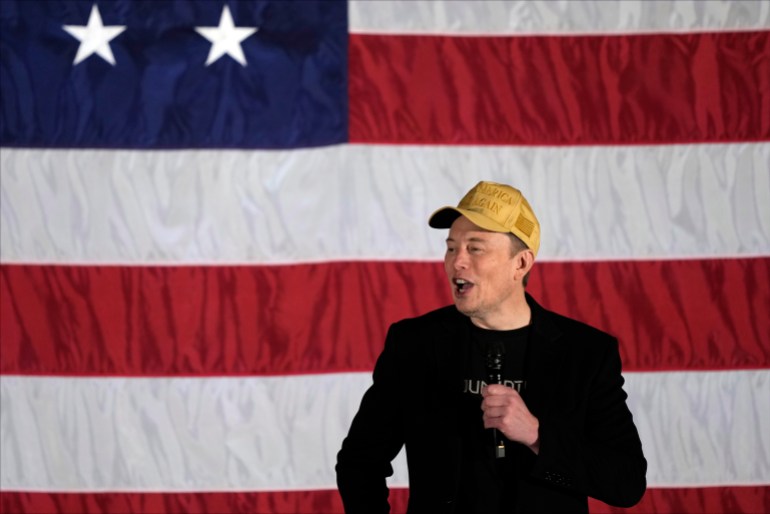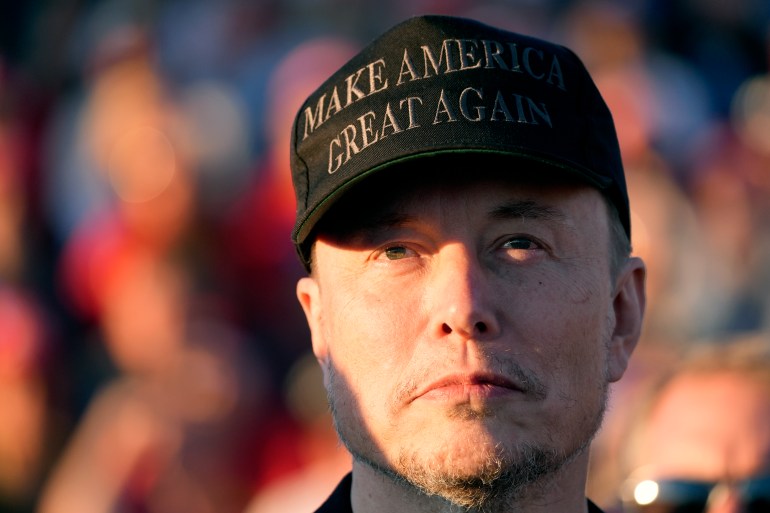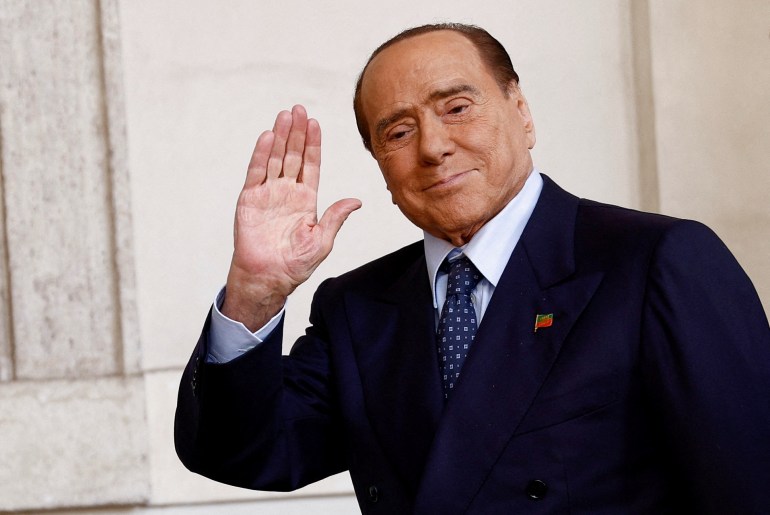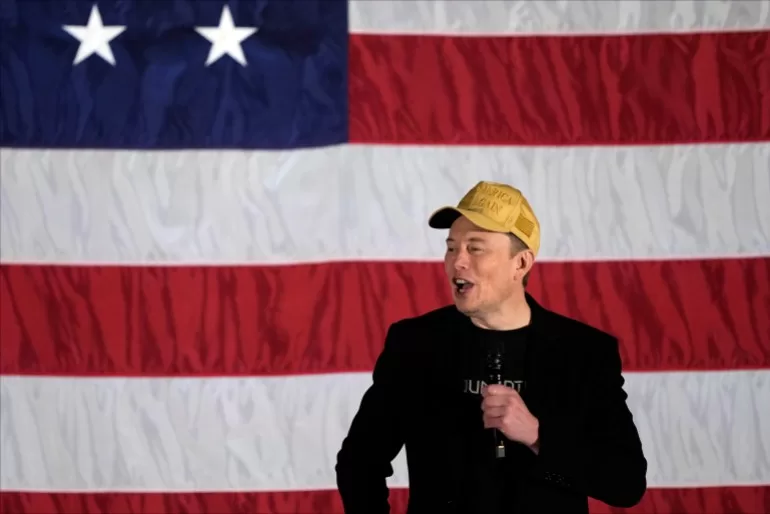If Elon Musk joins the United States government following a Donald Trump victory in the presidential election, he will be the latest in a succession of billionaire businesspeople to hold public office.
From the late Vice President Nelson Rockefeller and former New York City Mayor Michael Bloomberg to Illinois Governor JB Pritzker and former President Trump himself, the super-rich have long held positions of power in Washington, DC and across US state capitals.
With polls showing Tuesday’s election on a knife edge, Musk is in serious contention to join Trump’s cabinet after the Republican candidate floated the idea of the tech billionaire serving as so-called “Secretary of Cost Cutting”.
Since entering politics after decades in the real estate business, Trump has displayed a penchant for drafting high-net-worth individuals from the private sector.
During his first term in office, Trump nominated five people as Cabinet secretaries who had spent all or nearly all of their careers in the business world, including Exxon Mobil CEO Rex Tillerson, billionaire philanthropist Betsy DeVos, and former World Wrestling Entertainment CEO Linda McMahon.
According to an analysis by the Pew Research Centre, Trump’s first slate of Cabinet nominees had more businesspeople with no public sector experience than any other before it.
Musk, the world’s richest man, has called for drastic reductions in government spending, although he has provided few specifics about where he would direct cuts.
During Trump’s Madison Square Garden rally on Sunday, the CEO of Tesla and SpaceX CEO said the federal budget could be slashed by “at least” $2 trillion.
“Your money is being wasted, and the Department of Government Efficiency is going to fix that,” Musk told Howard Lutnick, the chief executive of Wall Street firm Cantor Fitzgerald and a member of Trump’s transition planning team, when asked how much he could “rip out” of the latest federal budget.
“We’re going to get the government off your back and out of your pocketbook.”
Such a reduction in spending – equal to nearly one-third of last year’s federal budget of $6.75 trillion – would almost certainly be impossible to achieve without steep cuts in areas that politicians across the aisle have been loath to touch, including social security, healthcare, veterans’ benefits, and defence.
Musk himself has acknowledged that such a sharp cut in spending would inflict serious economic pain.
On Tuesday, he responded “sounds about right” to a post on X that predicted there would be “an initial severe overreaction in the economy” and “markets will tumble.”
SpaceX and Tesla did not respond to requests seeking comment from Musk.

While politicians pledging to end wasteful spending is hardly new, there is no “precise parallel” to a businessman like Musk overseeing a department tasked with improving government efficiency, said Bruce Schulman, a professor of history at Boston University.
Political candidates that touted their experience in business, from former President George W. Bush to presidential nominee Mitt Romney, typically had a track record in public service before seeking to enter the highest levels of the federal government.
Government commissions aimed at eliminating waste and inefficiency – such as the Hoover Commission and the National Partnership for Reinventing Government led, respectively, by former President Herbert Hoover and Vice President Al Gore – have also generally been led by seasoned government officials.
Schulman said while initiatives to eliminate waste have been endorsed at various times by both Democrats and Republicans, they have been largely for “political show”.
“These efforts have had marginal effects, and mostly been for political show. But overall, both the size of the federal government in number of employees and in terms of spending have been flat for a long time even though the US population has increased dramatically. The federal government is much leaner than it was in the 1960s/70s,” Schulman told Al Jazeera.
John Pelissero, director of Santa Clara University’s Markkula Center for Applied Ethics, questioned Musk’s standing to hold a government position given his lack of experience in the public sector.
“Without any working experience in government, one might wonder how he could be qualified to occupy a position, for example, that focuses on government efficiency,” Pelissero told Al Jazeera.
“It is worth noting that past government efficiency or reform commissions have often been led by an individual who has earned public trust and has deep experience in government.”
While Musk has been lauded as a tech visionary in the private sector, his business track record is not without its stumbles and controversies.
Since his $44bn takeover of X in 2022, the social media platform’s value has fallen about 80 percent, according to a valuation by the investment giant Fidelity, largely as a result of advertisers leaving the platform over its loosening of content moderation.
The Environmental Protection Agency has accused SpaceX of polluting the area around its Texas base, damaging a surrounding state park and federal wildlife refuge.
In September, the agency fined SpaceX $148,378 over a chemical spill – a minuscule penalty for a company of its size that Musk nonetheless branded as “silly”.
A Cabinet position would be an enticing reward for Musk, who has emerged as one of Trump’s most vocal and powerful supporters since July’s failed assassination attempt on the former president.
Musk’s companies hold billions of dollars in contracts with government agencies, raising concerns that his elevation to the government would create potentially huge conflicts of interest.
SpaceX alone has received more than $15bn in government contracts for launching rockets for NASA, satellites for the Pentagon, and ferrying US astronauts to the International Space Station.
In February, the Wall Street Journal reported that the company was awarded a $1.8bn classified government contract with an unnamed government agency.
Tesla, which is facing regulatory scrutiny from numerous government agencies, stands to benefit from potentially looser regulatory enforcement during a friendly Trump administration, as well as tax cuts and subsidies.
X, meanwhile, provides Musk an “outsized ability to influence government policy and amplify his or Trump’s views/policies in government”, Pelissero said, adding that Musk should sell the platform if he is to enter government.

Musk’s influence has already been on full display in the presidential race.
The billionaire has poured at least $118m into Trump’s campaign through his America super PAC, advocated vigorously for Trump on X – including, at times, by spreading the Republican candidate’s false claims of election fraud – and stumped with him on the campaign trail.
His efforts to promote Trump have even gone as far as testing the limits of election law.
On Monday, Philadelphia’s district attorney filed a lawsuit requesting a judge to block Musk’s $1m daily giveaway for registered voters in battleground states, calling it an “illegal lottery scheme”.
The move came days after the US Justice Department sent America super PAC a letter warning that the lottery for voters who sign a petition supporting the First and Second Amendments of the US Constitution may violate federal law.
Despite his showmanship and uncensored comments, Musk is in some ways following a familiar playbook for US elites, said Daniel Krcmaric, an associate professor of political science at Northwestern University in Chicago and the co-author of a 2023 study on billionaire politicians.
“All of these tactics are part of a broader strategy to use his incredible wealth to sway – using informal means – the US presidential election in his preferred direction,” Krcmaric told Al Jazeera.
It is not unusual for the ultra-wealthy to throw their resources behind political candidates, whether Republican or Democratic, or exert influence over the government through their business interests, such as in the case of John Pierpont Morgan – aka J.P. Morgan – who functioned as a de facto central banker at the turn of the 20th century.
Though far from unheard of, it is less common for them to seek office.
Analysing data from the Forbes Global 2000 list of billionaires, Krcmaric’s study found that 11 percent of billionaires worldwide have either sought or held formal public office.
Transitioning from business to politics is far more common in autocracies than democracies, according to the study, with 29 percent of billionaires seeking or holding office in the former, compared with 5 percent in the latter.
Worldwide, the list of billionaire businessmen-turned-politicians includes former Italian Prime Minister Silvio Berlusconi, former Czech Prime Minister Andrej Babis, former Thai Prime Minister Thaksin Shinawatra and former Australian legislator Clive Palmer.

The US has a lower rate of political participation by billionaires than average, at just 3.7 percent, due to the many other avenues of influence available to them, according to Krcmaric, including bankrolling campaigns and advocacy groups.
During the current US presidential election cycle, the 50 biggest donors have given more than $2.5bn to influence political races and causes – about two-thirds of which favoured Republicans and conservative-aligned causes.
While Musk has only begun explicitly supporting Trump recently after years of expressing support for Democrats, he has publicly identified with conservative and right-wing causes since at least 2022, the year he bought Twitter – as X was then known – in a hostile takeover.
Soon after buying the platform that October, Musk reinstated the accounts of numerous right-leaning figures who had been banned for inflammatory posts or spreading misinformation, including Trump, self-described “misogynist” influencer Andrew Tate, Canadian psychologist Jordan Peterson, and US legislator Marjorie Taylor Green.
At around the same time, Musk began using his X account to issue warnings about the future of Western civilisation and the influence of the “woke mind virus”, referring to what critics say is left-wing politics’ support of censorship and obsession with race, gender and sexual identity.
“This is a battle for the future of civilization. If free speech is lost even in America, tyranny is all that lies ahead,” Musk said in a post on November 29.
As a self-described “free-speech absolutist”, Musk also dramatically curtailed content moderation on X and scrapped the platform’s “verified” feature for high-profile figures such as celebrities and politicians.
The changes drew criticism from liberal activists and misinformation scholars, who warned that they would lead to a rise in hate speech and the impersonation of public figures.
Musk’s engagement with fringe figures, such as conspiracy theorist Alex Jones, on the platform was also held up by critics as evidence of a sharp turn to the right.
Musk also began quietly donating tens of millions of dollars to conservative causes in the US, channelling money to the PAC Citizens for Sanity and the presidential campaign of Florida Governor Ron DeSantis, The Wall Street Journal reported last month.
In July, Musk announced his intention to move the headquarters of X and SpaceX from California to Texas to protest against a law that bans schools from forcing teachers to notify parents when their child changes their gender identity.
Musk’s turn to the right has also been on display in his expressed views about international affairs, including his promotion of a “plan for peace” in Ukraine that critics say closely aligned with the Kremlin’s talking points on the war.
Last week, the Wall Street Journal (WSJ) reported that Musk had been in regular contact with Russian President Vladimir Putin since October 2022, quoting current and former US, European and Russian officials.
While many of the details of the discussions were unknown, Putin reportedly asked Musk to refrain from activating his Starlink satellite internet service over Taiwan as a favour to his ally, Chinese leader Xi Jinping, the newspaper said, quoting a former Russian intelligence officer.
Xi, who has pledged to “reunify” democratic Taiwan with the Chinese mainland by force, if necessary, would likely cut Taiwan’s communication lines in the event of an invasion or blockade, according to security analysts.
Musk did not respond to WSJ’s request for comment on contact with Putin, the newspaper said, although he later mocked the article on X without denying its claims.
Regardless of the outcome of the election, Musk will continue to exert enormous influence, whether from the sidelines or from within the White House, said H.W. Brands, a professor at the University of Texas at Austin.
“Social media has given private individuals avenues to celebrity that didn’t exist before. Trump and Musk are good examples,” Brands told Al Jazeera.
“Trump had the additional advantage of his television show, but he outflanked regular Republicans in 2016 in a way that would have been nearly impossible in earlier generations.”
